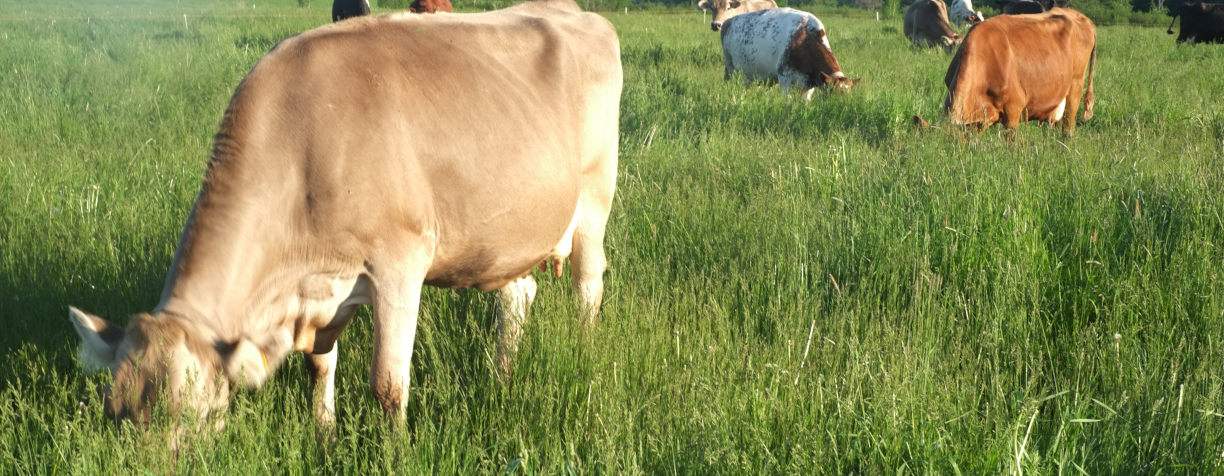Sonja Heyck-Merlin
Country Folks
Cobb Hill is a 270-acre co-housing community in Hartland, VT. The land is collectively owned by 23 families. Kerry Gawalt, her husband Stephen Leslie and their daughter Maeve live in Cobb Hill and operate Cedar Mountain Farm on the property. The diversified enterprise, which consists of a dairy, three-acre market garden and compost production, utilizes most of the 70 acres of open land owned by the community.
Stephen and Kerry are also co-owners of Cobb Hill Cheese, an artisan cheese enterprise that purchases its milk from Cedar Mountain’s herd of registered Jerseys. The creamery is located right next to the tie-stall barn and bedded pack hoop barn. The herd is milked in the tie-stall but housed in the pack barn when they are not out on pasture.
In late February 2020, Kerry and Stephen welcomed their first Dairy Grazing Apprentice, Maia Springfield, who comes from the urban outskirts of Detroit, MI.
“This is our first experience with the Dairy Grazing Apprenticeship,” said DGA Master Grazier Kerry. “We were looking for a person, not just an employee, with a specific interest in dairy farming, and DGA helped connect us with potential candidates.”
Wisconsin-based DGA is the first federally-recognized agricultural apprenticeship in the U.S. DGA connects Master Graziers with people who have an interest in pasture-based dairy farming. The program now has 45 active Master Dairy Grazier-Apprentice pairs and 37 Journey Dairy Graziers. The apprenticeship is two years and requires 4,000 hours of on-farm training. Apprentices must also take six online one-credit classes and complete 40 hours of off-farm education through workshops, webinars and farm visits.
“I like the structure that the program provides,” Kerry said. “With this program, someone can foreseeably gain all the necessary tools to operate their own farm successfully.”
To find Maia, Kerry browsed the database of DGA applicants and reached out to her. Although Maia came with no agricultural experience and had just turned 18, Kerry and Stephen were encouraged by her enthusiasm. From Kerry’s perspective, it is often easier to train someone from scratch rather than untrain previously learned practices.
“I first became interested in agriculture when I was 16,” Maia said, and she satisfied the urge by starting a backyard garden and doing a lot of reading. During this research, she found the DGA website, applying the day she turned 18 (DGA applicants must be 18). Maia found DGA more compelling than other farm apprenticeships because of its structure and its balance between working on the farm and completing relevant coursework.
Now, six months into the program, Maia has settled into the rhythms of farm life and balances her time between dairy chores and helping in the creamery and market garden. She lives on the farm in an apartment. “Although the DGA program operates on a 40-hour work week, we have found that a 30-hour week works better for Maia,” Kerry said. “It will take her longer to finish the program, but we also don’t want her to be stressed.”
Right now, Maia gets most of her hands-on cow experience during evening milking chores. Her evening shifts begins by fetching the herd from pasture. The herd includes all of the milking cows plus bred heifers and a small group of Jersey steers raised for beef. As they enter the barnyard, the animals are sorted into two groups – the milk cows are sent to the tie-stall for milking, the heifers and steers guided into the bedded pack.
Once the animals are situated, she begins milking. Evening chores also include feeding calves and feeding the dry cows and young stock who are not pastured.
Maia’s current DGA class is Milk Quality. It’s an asynchronous online class, meaning that she can watch the lectures at her convenience. There are weekly assignments and a discussion board that allows apprentices to share ideas and anecdotal information from their farms.
Her apprenticeship requires six more classes: Dairy Cattle Nutrition, Farm Business Management, Dairy Cattle Health and Wellness, Managed Grazing Systems, Soil and Water Resource Management and Holistic Farming and Systems Approach.
Earlier in the season, Maia was learning the nuances of rotational grazing with Stephen, but a recent ankle sprain has prevented her from hoofing it up and down the farm’s 50 acres of steep pasture. Since she is doing less fencing and fieldwork, she has more time to work in the creamery which produces a line of six raw hard cheeses. Stephen and Kerry are also members of the DFA milk co-op who pick up any milk that they don’t process themselves. While she appreciates the exposure to direct marketing and cheese making, Maia said, “I don’t think cheesemaking will be part of my future farm.” From her perspective, the process is too scientific and the regulations seem onerous.
Because of COVID-19, Maia hasn’t yet been able to fulfill many of the 42 hours of off-farm visits and workshops DGA requires. “We’re looking forward to getting Maia on some different farms,” Kerry said, “so that she can see operations running at a different scale. There is a farm nearby milking with eight robots and another milking 1,500 in a parlor.” So far, Maia has only been able to visit one farm – an organic dairy owned by Mary Franklin. Franklin also serves as the Vermont DGA coordinator.
Despite the challenges of moving to a new place, learning the systems unique to Cedar Mountain and a pandemic, Maia is still enthusiastic about her DGA apprenticeship and a future of farming. “When I first started,” Maia said, “I was overwhelmed. I remember thinking ‘What have I gotten myself into?’ Each time I do chores though, it gets easier, and I am getting more comfortable with the work.”


